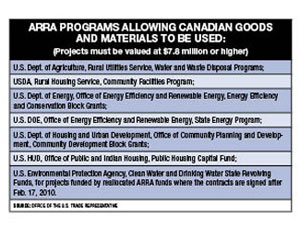A recent U.S.-Canada trade agreement that attempts to resolve a dispute over the American Recovery and Reinvestment Act’s “Buy American” provisions will provide some help for water and wastewater companies in both countries, but in many ways it is too little, too late, industry sources say.
The agreement, which took effect on Feb. 16, waives the Buy American requirements for ARRA-funded contracts awarded through September 2011 that use components manufactured in Canada. On both sides of the border, the Buy American spat has been of keen interest to water and wastewater firms, which contend the mandate has unnecessarily slowed down infrastructure projects. ARRA requires municipalities to get waivers if they want to use non-U.S.-made parts for Environmental Protection Agency state revolving fund (SRF) stimulus projects. Obtaining those waivers often can be time-consuming, firms say.
Industry officials say they welcome the agreement with Canada, the United States’ largest trading partner, but add they don’t expect to see a major impact. “We’re pleased...but it’s a little late in the game,” says Perry Fowler, the Associated General Contractors’ director of government affairs. As of Dec. 31, 61% of the ARRA clean-water SRF aid and 56% of the stimulus measure’s funds for drinking-water SRFs were fully under contract. The trade agreement is not retroactive, so it applies only to contracts funded after Feb. 16.
Nevertheless, Diane Shea, director of environmental and engineering programs for the American Council of Engineering Companies, notes that projects not yet under contract “are going to benefit if the parts that were specified by the engineering firms were Canadian.”
Dan McCarthy, president and CEO of Overland Park, Kan.-based Black & Veatch’s global water business, says his firm is still receiving ARRA contract awards. The recovery act funding “didn’t flow as quickly as some of the designers of the bill thought would happen,” McCarthy says.
ACEC’s Shea notes, however, the agreement applies only to Canada. Municipalities and engineering firms that want to use parts manufactured in other countries, such as Taiwan, Sweden, Australia and Germany, still are subject to the Buy American requirement.
The Canadian government aggressively sought the trade deal. Birgit Matthiesen, special adviser, U.S. affairs, to the president and CEO of the Canadian Manufacturers and Exporters, calls the pact “a first and important step forward.” But, she adds, “We’d like to see a deeper, broader procurement agreement with the United States in the future.”



Post a comment to this article
Report Abusive Comment